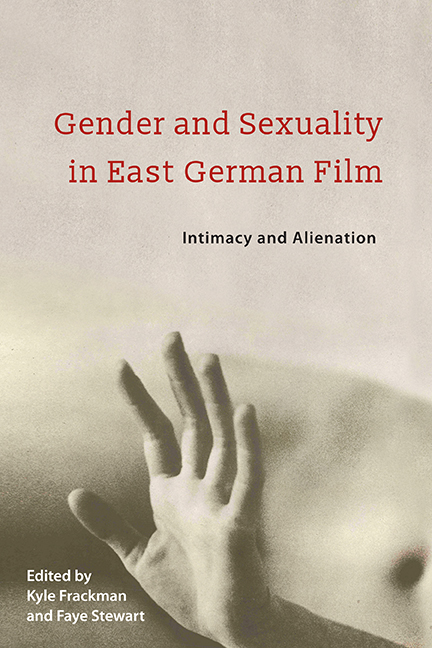Book contents
- Frontmatter
- Contents
- Acknowledgments
- List of Abbreviations
- Introduction: Sex and Socialism in East German Cinema
- 1 Hypnagogic Mothers: Gender, Amateur Film Labor, and the Transmissive Materiality of the Maternal Body
- 2 Powerless Heroines: Gender and Agency in DEFA Films of the 1960s and 1970s
- 3 Jutta Hoffmann and the Dialectics of Happiness: A Socialist Star in Close-Up
- 4 Who Is the “Third”? Homosociality and Queer Desire in Der Dritte
- 5 Volatile Intimacies and Queer Polyamory in GDR Film
- 6 Interracial Romance, Taboo, and Desire in the Eastern Counter-Western Blutsbrüder
- 7 The Desire to Be Desired? Solo Sunny as Socialist Woman's Film
- 8 Ambivalent Sexism: Gender, Space, Nation, and Renunciation in Unser kurzes Leben
- 9 Dealing with Cancer, Dealing with Love: Gender, Relationships, and the GDR Medical System in Lothar Warneke's Die Beunruhigung
- 10 Reimagining Woman: The Early Shorts of Helke Misselwitz
- 11 Shame and Love: East German Homosexuality Goes to the Movies
- 12 Gendered Spectacle: The Liberated Gaze in the DEFA Film Der Strass
- Notes on the Contributors
- Index
6 - Interracial Romance, Taboo, and Desire in the Eastern Counter-Western Blutsbrüder
Published online by Cambridge University Press: 16 May 2018
- Frontmatter
- Contents
- Acknowledgments
- List of Abbreviations
- Introduction: Sex and Socialism in East German Cinema
- 1 Hypnagogic Mothers: Gender, Amateur Film Labor, and the Transmissive Materiality of the Maternal Body
- 2 Powerless Heroines: Gender and Agency in DEFA Films of the 1960s and 1970s
- 3 Jutta Hoffmann and the Dialectics of Happiness: A Socialist Star in Close-Up
- 4 Who Is the “Third”? Homosociality and Queer Desire in Der Dritte
- 5 Volatile Intimacies and Queer Polyamory in GDR Film
- 6 Interracial Romance, Taboo, and Desire in the Eastern Counter-Western Blutsbrüder
- 7 The Desire to Be Desired? Solo Sunny as Socialist Woman's Film
- 8 Ambivalent Sexism: Gender, Space, Nation, and Renunciation in Unser kurzes Leben
- 9 Dealing with Cancer, Dealing with Love: Gender, Relationships, and the GDR Medical System in Lothar Warneke's Die Beunruhigung
- 10 Reimagining Woman: The Early Shorts of Helke Misselwitz
- 11 Shame and Love: East German Homosexuality Goes to the Movies
- 12 Gendered Spectacle: The Liberated Gaze in the DEFA Film Der Strass
- Notes on the Contributors
- Index
Summary
IN CONTRAST TO the majority of Hollywood Western films, which typically celebrated the pioneers’ courage in fighting the “savage Indians” on the American frontier, the East German Indianerfilm (American Indian film) of the 1960s and 1970s typically featured Native American focal characters. Here, the Native American heroes often gathered with protagonists of various national backgrounds in order to fight the cruelties of American capitalist expansionism. In many DEFA Westerns, this dynamic also plays out among the films’ international cast members: accordingly, the films’ counter-discourse not only celebrates the international solidarity among the fictional heroes on screen, but also emphasizes the actual international camaraderie of the “red brothers,” who unite for the production of this “red Western,” “borscht Western,” or “Eastern.”
The red Western Blutsbrüder (Blood Brothers, 1975, dir. Werner Wallroth) not only presents one of the few interracial marriages in DEFA film, but also assembles two popular performers of GDR fantasies of the American frontier: the rock star and heartthrob “cowboy” Dean Reed from the United States as the white American deserter Harmonika (Harmonica), and DEFA idol Gojko Mitić from Serbia as his brotherin- law, the warrior Harter Felsen (Hard Rock). I argue that the representation of the on- and off-screen solidarity among the two male heroes reduces the heterosexual romance between Harmonika and the Native American maiden Rehkitz (Fawn, played by Gisela Freudenberg) to a mere catalyst for dreams of interracial antifascist male bonding. In this context, I investigate to what extent this counter-Western or “Eastern” follows narrative and visual amorous gender cliches of the Western genre and of DEFA films of its time and how it changes and reverses familiar romance plot patterns. Here, I am mainly concerned with the symbolism of the brown-faced DEFA Indianer as othered, racialized, sexualized, and gendered bodies, which represent sites for inscribing both similarity and difference in their romantic appeal to GDR spectators.
Real existierender Sozialismus, utopischer Sozialismus, and the Romanticism of the Diegetic and Nondiegetic Community of “Red Brothers”
According to Wolfgang Emmerich, the GDR's cultural production of the 1970s transitioned from realistic depictions of real existierender Sozialismus (real existing socialism) to a new form of aesthetics that he calls utopischer Sozialismus (utopian socialism).
- Type
- Chapter
- Information
- Gender and Sexuality in East German FilmIntimacy and Alienation, pp. 126 - 145Publisher: Boydell & BrewerPrint publication year: 2018
- 1
- Cited by



